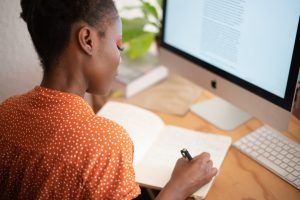
TUSCALOOSA, Ala. – Faculty at The University of Alabama are available to discuss aspects of continuing the academic year for primary and secondary schools remotely across the state. For assistance with reaching any of these sources or for topics not highlighted, please contact Shane Dorrill, assistant director of communications, at shane.dorrill@ua.edu.
Online Educational Activities
Dr. André Denham, associate professor for instructional technology in the College of Education, can discuss online resources parents can use to help their children as well as some tips for using educational technology in the home. “With the recent suspension of face-to-face instruction and transition to online instruction due to COVID-19, students and parents across the country are entering uncharted waters,” Denham said. “Fortunately, there are ample online resources and activities that can help K-12 students as they transition to online learning. I want to stress that it is important for students to remain active during these uncertain times. Continuing the learning process is one way that you can do that.” Denham is available for interviews and can be reached at adenham@ua.edu.
Distance Learning
Dr. Lisa Matherson, clinical assistant professor and coordinator for continuous improvement in the College of Education, can discuss the value of technology and education. “Today, more than ever, those in the world of education have been forced to quickly see how the school is more than brick and mortar. Having to rapidly prepare for distance instruction has many educators adopting and embracing new ways of doing things. In distance education, classroom educators become more of a facilitator than a disseminator of information. Many factors must be considered in the complexity of distance education, such as the best technology platforms and tools to use. Distance education allows students many new facets through which to engage as they continue their learning. Through distance education, students will be afforded the opportunities to continue moving forward in meeting the disciplinary standards and not fall behind.” Matherson is available for interviews and can be reached at lhmatherson@ua.edu.
Adolescent Mental Health
Dr. Deborah Casper, assistant professor of human development and family studies, can discuss friendships, bullying and mental health for adolescents during this time. “Given we have nothing to directly compare to the current situation, we do know the importance of fostering healthy peer relationships,” she said. “It will be important for parents to allow time for their teens to connect virtually. It is also important, however, to have open, not forced, communication with the teen to monitor the tone of the interactions with peers.” Casper is available for interviews at dmcasper@ches.ua.edu.
Staying Healthy
Lori Greene, a registered dietitian, an instructor for food and nutrition studies and mother of three, can discuss healthy snacks for families, cooking with kids, meal prepping and staying physically active with your kids during this time. “Many parents now have the time to cook meals with families gathering around the table that research tells us is so important. Take advantage of these times and buy items for you to prepare for your family, but also foods for kids to get in the kitchen,“ she said. “We also have an opportunity to be more physically active as a family and we should not pass up this opportunity to improve our health in this situation.” Greene is available for interviews at lgreene@ches.ua.edu.
Young Children Learning
Dr. Kimberly A. Blitch, assistant professor of human development and family studies, can talk about the need to keep young children engaged during this time when many preschools and kindergarten programs are also closed. “In the absence of these enriching experiences in their regular early learning programs, young children need play-based learning opportunities at home within the context of nurturing and supportive relationships with adults,” Blitch said. “For children, every day is an Einstein kind of day – full of invention, innovation and discovery. Children learn through play. Play is their work. It’s their means of learning.”
Remote Instruction in Higher Education
Dr. Claire Howell Major, professor of higher education at UA, teaches technology in higher education. “We are having to shift en masse to emergency remote teaching. We have faculty who have been teaching on campus in a face-to-face mode who are having to figure out how students can connect around content and learn for the remainder of the semester using internet tools available to them.” Major is available for interviews and can be reached at cmajor@ua.edu.
Parental Stress
Dr. Karly Downs, licensed marriage and family therapist and assistant professor and clinical director for concentration in marriage and family therapy in the human development and family studies department, can talk about the stress families can experience during this time when normal support is difficult. “Parents need to remember that nothing is normal and that that is OK, not ideal, but OK,” she said. “Do not judge yourself as a parent. Instead, focus on the moments of joy throughout the day, make sure to take time – even a few minutes – to calm your emotions and reflect on what brings you hope.” Downs is available for interviews and can be reached at kdowns@ches.ua.edu.
Contact
Shane Dorrill, assistant director of communications, shane.dorrill@ua.edu
